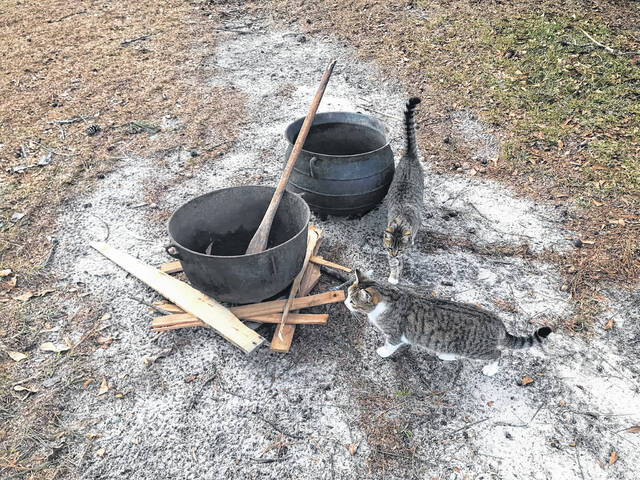Any of y’all remember when everyone had a clothesline and a #12 or bigger wash pot sitting in the backyard? Well if’en you do, you’re ‘bout my age or older.
For young folk, a clothesline could be a single strand, double or even a triple line of smooth wire stretched between two or more posts or trees. Sometimes, a forked stick or board was used to prop the line up to keep the clothes from hitting the ground. If’en it was a big washing, and you ran out of room on the line, folks would hang their clothes on a bush to dry.
You see, when I was coming along most folk didn’t have or couldn’t afford what they called a ringer washer, no siree. That’s where the wash pot comes in. It’s a large, black, cast-iron pot with three little feet and two small handles on the sides. Most didn’t come with a lid so if you wanted a lid, you just placed a piece of tin on top. The wash pot could be used for many purposes such as to wash clothes, render lard and pork cracklings, fry fish, make lye soap or even cook up a pot of catfish or chicken stew.
Why if’en you had a big family there might be two or more wash pots in your backyard. One pot to boil water and wash your clothes in and the other to rinse them in. Then there would be several old scrub boards hanging on the side of the outbuilding to use if you needed to scrub your work clothes to get them clean. Otherwise, you’d just have to add more lye soap to the boiling water and commence to stirring them clothes round and round in that wash pot.
Mondays was usually wash days for most folks that is if’en the weather cooperated. My grandpa and I would get up early and fill each wash pot with water hand-drawn from our well. Then we’d build a small fire around the wash pot with stove wood. You didn’t need a large fire but it had to be hot enough to boil the water in the pot. Won’t no switches or controls. Why if’en you wanted a hotter fire, you just added more wood and to lower the heat you’d just rake the coals back.
Grandma would wash her white clothes first; then long johns and last; the dirty work clothes. Lye soap was added to the pot and the clothes stirred with an old broom handle or homemade wooden paddle.
After each washing, the clothes would be placed in a pot of cold clean water and rinsed. Then the clothes would be rung out by hand the best you could and hung on the clothesline. You would have an array of clothes; underwear and linens blowing in the wind just as pretty as you please.
You see, that’s why you wanted to do your washing on a sunshiny day. If’en a storm came up, you best be getting them clothes off the line and in a hurry, don’t you know.
To hold the clothes on the line we used wooden clothespins that didn’t have wire springs attached. When we got a hold of the spring type we thought we was in high cotton.
When the clothes were dry, Ma would take ’em off the clothesline and place them in a woven wooden basket. My, how good them clothes would smell all fresh and clean.
Then, they were taken in the house to be ironed on a homemade wooden ironing board. Ma still had several of them old smoothing irons you heated by the fireplace. Won’t long though she had saved her tobacco money and bought one of the electric irons.
Why, I remember when I was small, Grandpa would turn them wash pots upside down to keep them from rusting. He’d tell me, “Boy, don’t you be fooling with them wash pots cause the Old Devil might be hiding under one of them.” Well, he might as well as told me to turn them back over. I just couldn’t resist the temptation. I got me several old bricks and a tobacco stick and pried one right over. To my surprise, this big toad frog jumped out right in my face. I just knew that frog was the Devil himself!!!
Until this day, this Ol ’Boy still don’t have no use for no toad frogs, I want you to know.
J.A. Bolton is author of “Just Passing Time,” co-author of “Just Passing Time Together,” and just released his new book “Southern Fried: Down-Home Stories all of which can be purchased on Amazon. Contact him at ja@jabolton.com.

